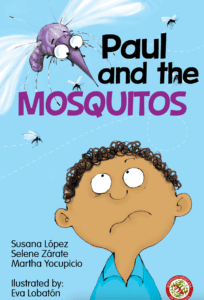From the authors of Paul Has Measles and Paul Stays Home comes Paul and the Mosquitos, an illustrated book for children about mosquito-borne diseases.
In his camp, Paul and his friends discuss which is the most dangerous animal of all. They would never have imagined it would be the mosquito. Why are they dangerous and what can we do to prevent the diseases transmitted by them?
Paul and the Mosquitoes is written by Susana López, Selene Zárate, and Martha Yocupicio, with illustrations by Eva Lobatón.
A pdf of Paul and the Mosquitos can be downloaded free of charge here.


I adore these books! Thank you!
Question:
In the US, would you say tick-borne disease is more of a concern than mosquito-borne disease?
This is my current reasoning behind hating ticks more than any other animal. But if I think globally, it would have to be mosquitoes, right?
Which animal is the worst, from a human perspective, where the answer is not humans/other humans?
Pingback: TWiV 788: neuroCOVID with Kiran Thakur, MD | This Week in Virology
Professor,
Could you respond to this video? https://youtu.be/5a7PLv9JkF4
It states that in areas where Pfizer Moderna and other big pharmas conducted their clinical trials, participants living in the same area are also the areas in which the majority of variants were first introduced. The focal assumption is that the numerous variety in covid vaccines are all leaky, leading to immunity escape, which breeds more virulent strains of coronavirus.
This assumption on an imperfect vaccine is not new. Similarly, the virulent marek’s vaccine also caused a commotion. To which, I read your response to the similar standpoint dated in 2015. However, it still puzzles me as to why the variants coincided with the geographic in which clinical trials volunteers inhabited?
I’m super confused on this issue. Please address this! Thank you
Professor
Can you address the issues of the YouTube video on your podcast?
Regards,
Theresa Vo